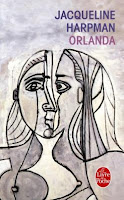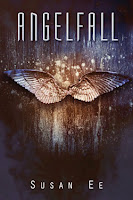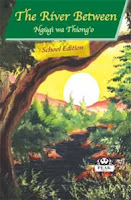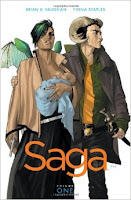Hype, hype,
hype! I think sometimes we’re so hungry for proper good fantasy stuff that
when appealing crumbs do come out, we make a whole meal out of them.
All right, I must admit, considering the amount of fantasy crap out there, this is a good book. I enjoyed reading it, I want to know what will happen next, and I will go on reading the next ones. Hence, I’d give it a four stars out of 5 rating because I truly believe it deserves no less. That being said, I had major issues while reading and I'm pointing them out because, in fact, they really prevented me from loving it. So, let's not dwell on positive points here. I can’t say I thought about the book much when it was closed and I was off doing something else. These are the reasons why:
All right, I must admit, considering the amount of fantasy crap out there, this is a good book. I enjoyed reading it, I want to know what will happen next, and I will go on reading the next ones. Hence, I’d give it a four stars out of 5 rating because I truly believe it deserves no less. That being said, I had major issues while reading and I'm pointing them out because, in fact, they really prevented me from loving it. So, let's not dwell on positive points here. I can’t say I thought about the book much when it was closed and I was off doing something else. These are the reasons why:
The writing: though that’s really not important to me, I
agree with the comma issue other reviewers found and I wonder to what extent
the translated versions improved readers’ opinions of the book by adopting the
correct grammar in their own language. My mother, for instance, read it in
French and did not seem to find any comma issue… that’s just plain cheating!
The fantasy: unfortunately, as we leave part I, Blood Song
starts to read more and more like our world and less and less like fantasy. Sometimes,
Ryan spends so much time exploring his supporting intrigue of religion and political
and moral power that he seems to forget to actually invest in the fantasy. As did
others, I found a problem in the lack of world description. I mean, without
Ryan ever saying so, we can assume they’re white, live in a western type of
world and so on…But, so what, where are the traditional and much hated
landscape descriptions? The maps are richer than the text in giving us clues to
their world. World description, world-building, stronger mythopoeia are needed
for a book of this size and three things Ryan should seriously invest in. Particularly
since we spend so much time in the same place with, we suppose, dark surrounding
woods where assassins creep; and later we roam across three different
lands, for Fantasy’s sake! Really, just for the sake of the atmosphere, we need
some adjectives here.
The scenes: the whole
book is good but its 5 parts are not always even in quality, though that’s
understandable if Ryan took 6 years to write it. Despite this, I can’t think of
a chapter that really stands out because it’s full of suspense, or drama, or
sex, or whatever. Even past their childhood years, there’s very little talk of
sensuality (the one sex scene is passed over), and worse, not enough humour,
fun or gratifying scenes where you go YES!
I know that sounds teenage-ish but, part of the good stuff in reading fantasy
is that you’re bound to get taboos a little slighted in a way that would be
more seriously considered in novels. Here you get none of it. I think I’ve laughed
three times across 730 pages; the violent scenes left me unshaken (except for the
early unnerving abuse scenes, and yes, I call that abuse!); and the scary
scenes were not that scary. Taken one by one, the scenes are not that
interesting (except the boys’ discussion bits, generally good). The only thing
that really marked my mind was the repetitious beating with the cane.
Most noticeable, the battle scenes move far too quickly. The attack on the High Keep, for instance, is the matter of a chapter, and marching across the Realm was just another. Even the Alpiran Empire battles are quite short. And why? Well, because Vaelin does not intervene in those battles, despite being a warrior legend: not in the keep, not in Alltor, nor in Marbellis or Untesh.
All of this undermines the importance of those moments, and thereby of Vaelin’s legend. It’s as if Ryan wanted us to feel for Vaelin, what he’s going through and such, but never really took the time to show us what he is going through. The author tells us Vaelin feels pain, but I don’t really see it. He seems so indifferent to everything and when events do end tragically, they are swept over by the next chapter.
Most noticeable, the battle scenes move far too quickly. The attack on the High Keep, for instance, is the matter of a chapter, and marching across the Realm was just another. Even the Alpiran Empire battles are quite short. And why? Well, because Vaelin does not intervene in those battles, despite being a warrior legend: not in the keep, not in Alltor, nor in Marbellis or Untesh.
All of this undermines the importance of those moments, and thereby of Vaelin’s legend. It’s as if Ryan wanted us to feel for Vaelin, what he’s going through and such, but never really took the time to show us what he is going through. The author tells us Vaelin feels pain, but I don’t really see it. He seems so indifferent to everything and when events do end tragically, they are swept over by the next chapter.
The weird treatment of violence: as noted above, the violence lacks
where it should be present, but abounds where it’s uncalled for… If the boys
did not agree so easily with the routine of their beating and constant lies and
ideology on the part of the Orders (granted they’re only boys but they seem
clever enough in noticing other stuff), I’d feel more for them when they do
complain of unfairness. We need tears here, the narration demands it, but I
can’t cry at the many hardships they encounter, though I’ll cry in front of any
stupid movie. There’s too much hardship for their easy acceptance of it, yet
too little actual sufferance on their parts to make us feel for them. That’s
another thing, too! The amount of caning here is unlikely for the little damage
it seems to do. Broken nose, broken ribs, and whatnot, and none of them seems
to keep those marks in their later years? Hum.
Ryan seems to confuse strength with violence, hardship with effort, and to take a voyeuristic pleasure in presenting the hardness of the boys’ education as the only way to make them strong. A lot of show to gain our sympathy, not a lot of the judgement which is supposed to follow the first movement of sympathy. There’s nothing bitterly tragic about giving and taking in constant caning and I’m sure all people out there who suffer abuse of some sort would agree with this! This neutral “yeah so I took a beating but I was strong so I did not say/do a thing” attitude, with a lot of description of blood and so on, is very immature in a book. What’s more, that attitude sticks, even in his adult life. Past the first time, Vaelin does not condemn it anymore; it’s ok, it’s just part of life, he’s content with shrugging his shoulders. He just shrugs his shoulders a lot, don’t he?, or at least that’s how I see him. Hum, not very heroic. It devalues Vaelin completely because it gives him the conscience of a sheep: he just does whatever anybody else does and, given the impact of his education on him, it’s a wonder he has any independence of mind left in him at all. It’s almost contradictory that he should betray his Faith so easily with the Denier thingy (perhaps that’s his mother’s voice there, while the blind acceptance is his father’s…).
I know Ryan wants to show how a child comes to accept and identify with his education, no matter how wrong and fanatical it can be, but reading his narration just makes me feel as if Ryan had come to accept it too. So, which is it? Does he sympathize or cane them some more? The reader criticizes where the author and the characters admire. I understand the concept of nuance Ryan wanted to gratify his characters with; I just think the book is weirdly sprinkled with it. When there’s ambivalence, it never goes much further than a simple shaking of the head; it never amounts to much.
Ryan seems to confuse strength with violence, hardship with effort, and to take a voyeuristic pleasure in presenting the hardness of the boys’ education as the only way to make them strong. A lot of show to gain our sympathy, not a lot of the judgement which is supposed to follow the first movement of sympathy. There’s nothing bitterly tragic about giving and taking in constant caning and I’m sure all people out there who suffer abuse of some sort would agree with this! This neutral “yeah so I took a beating but I was strong so I did not say/do a thing” attitude, with a lot of description of blood and so on, is very immature in a book. What’s more, that attitude sticks, even in his adult life. Past the first time, Vaelin does not condemn it anymore; it’s ok, it’s just part of life, he’s content with shrugging his shoulders. He just shrugs his shoulders a lot, don’t he?, or at least that’s how I see him. Hum, not very heroic. It devalues Vaelin completely because it gives him the conscience of a sheep: he just does whatever anybody else does and, given the impact of his education on him, it’s a wonder he has any independence of mind left in him at all. It’s almost contradictory that he should betray his Faith so easily with the Denier thingy (perhaps that’s his mother’s voice there, while the blind acceptance is his father’s…).
I know Ryan wants to show how a child comes to accept and identify with his education, no matter how wrong and fanatical it can be, but reading his narration just makes me feel as if Ryan had come to accept it too. So, which is it? Does he sympathize or cane them some more? The reader criticizes where the author and the characters admire. I understand the concept of nuance Ryan wanted to gratify his characters with; I just think the book is weirdly sprinkled with it. When there’s ambivalence, it never goes much further than a simple shaking of the head; it never amounts to much.
The hero: So far, Vaelin doesn’t have much personality.
He’s rough, ill-tempered, indifferent, but that’s it. What are his tastes, his
particularities, his flaws and qualities beyond the sword? It’s difficult to
feel pain for him when he loses someone along his path of tragic destiny, yet,
easy to feel for the lost person: clearly, we are not close enough to him. Who
is he? A nobody really. And to me, that never fares well in fantasy. His
not-as-heroic-as-the-writer-would-have-it thingy is a big issue because, despite
the fact that we follow him all throughout, I can’t get attached. He doesn’t
annoy me or anything; he leaves me pretty indifferent (which might be worse).
The character is too much of a hero, without having the shine to live up to it. Why should he be the hero of this tale? Why not Frentis or Dentos or Northa? I still don’t know, outside of the obvious fact he was given a power. More could have been invested in building and giving Vaelin an actual personality and do without the following clichés:
The character is too much of a hero, without having the shine to live up to it. Why should he be the hero of this tale? Why not Frentis or Dentos or Northa? I still don’t know, outside of the obvious fact he was given a power. More could have been invested in building and giving Vaelin an actual personality and do without the following clichés:
- ·
Blood song and other tricks: his mighty magical power renders
him so perspicacious in seeing who wants him ill as to make him invincible,
despite the ever growing number of enemies. Hence, he can do everything. Well,
that provides an easy way out of any embarrassing plotlines: things declared hard to do suddenly
become easy. Taking over the impregnable High Keep? Seems to me it’s clearly
not high enough, and what’s the point of concealing such a fortress as a
precious strategic treasure if it’s that easy to steal it? ; defeat the Trueblade
; defeat the Shield ; defeat the Hope… Come on, why not end the story directly with
a “And Vaelin killed them all, so mighty was he and so clear was his blood
song, and lived guiltily ever after, wondering at his cruel fate…”
He encounters no resistance from anybody, he’s never in a serious danger or threat: they are so many manipulative assholes in this tales, yet either they favour him like the King or the Departed; are in love with him like Lyrna; or keep him for five years imprisoned without hurting him one notch, only on the basis of a silly deal that one wonders must take so long to conclude... Not very credible! And by undermining his enemies so, Ryan undermines Vaelin’s strength and bravery.
- · General remarkable skills with swords, finding his marks in the wild, attracting women and charming wild animals that others fear so, and flaunting a perpetual scowl. Hence, he becomes a legend after only one brawl with the Realm guard. Why? I still don’t get it.
- · As Goodreads reviewers have noted, giving Vaelin a horse and a hound was part of the hero clichés. But they’re both constantly talked of, and both barely useful; even in those times Scratch does defend him, it could have easily been done by the wolf.
- · And yes, he can’t have the one woman, the first and only woman in all points, he wishes so bad to have. Because of the Orders, because of the King, because of the princess, at some point because of the plague, and because of Evil. Come on… (Then, the woman herself, My God! Sherin is such a goody two-shoes she’s too annoying. Vaelin, slap her face already!)
All of that
means he doesn’t become a hero, he’s made of an already-shaped mould and we
have to accept it. I’m sorry but in good adult fantasy, heroism is an acquired
quality, not an innate one.
The third-person narration choice: I think that doesn’t help me care
for the characters because I never really identify with them or feel for them;
I read about them, I’m not living it out with them. A first person narration
would have made the book so much stronger, at least for that first part, especially
since there’s no scene outside of Vaelin’s knowledge described here. So really,
why not a first-person account? We’ll know why in the follow-up book. Still,
though, Vernier’s accounts are so much better written than Vaelin’s life, so,
really, I think Ryan is stronger at the “I” narrative. It would have made his
hero closer to us basically, and if you’re going to tell a tale of a war legend,
a hero, you’d better make sure your main character feels like a hero to the
reader: we need to get more in his thoughts, to feel as he feels, Fitz’s style.
Conclusion: the one big criticism I have, (which is more
related to my own taste, fantasy-wise), is that the book is not fan-material
for me. It doesn’t make me wanna go: “Oh, no! what will happen to Vaelin next?!”
The suspense is there, though, and in fact, I care more about the intrigue than
about the one living it.
I liked Blood Song, I can see it’s well written, thoroughly thought through, and the writer himself loves it, but I can’t say I’m a fan of it. And it’s too bad because, to me, with all there is in it, it was just that close to being a fantasy masterpiece.
I liked Blood Song, I can see it’s well written, thoroughly thought through, and the writer himself loves it, but I can’t say I’m a fan of it. And it’s too bad because, to me, with all there is in it, it was just that close to being a fantasy masterpiece.
P.S. Hum,
all the areas of the Realm end in ‘ael’, in particular Asrael, and the Realm sits
opposite to an "Arabic" type of Empire… And in my version, there’s an interview
of Ryan stating he got some inspiration from the post-9/11 events...
Interesting…










